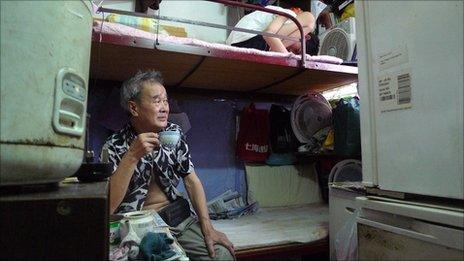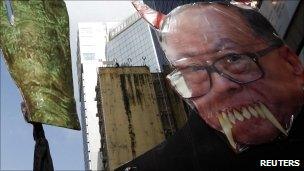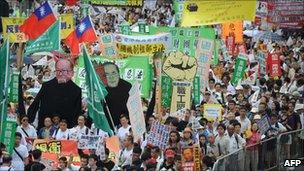Discontent grows in Hong Kong despite boom
- Published

Hong Kong is one of Asia's wealthiest economies but many residents are mired in poverty
In some respects, Hong Kong has never had it so good.
The economy in this former British territory is booming, reaping the rewards of China's rise.
Employment is at an all-time high and the government is so flush with cash, it is literally giving it away - each permanent resident is due to receive 6,000 Hong Kong dollars ($770; £480) later this year.
But try telling Tam Kin Wai, a retired hospital porter, that times are good.
He lives in a "cubicle home" that is barely 2m (6ft) wide with his wife and 13-year old son in Sham Shui Po. They must share a toilet and kitchen with eight other families. "Living costs are always going up," he says.
Bypassed by the boom
Mr Tam is one of about 100,000 people who live in inadequate housing - sometimes these homes are barely bigger than a coffin - according to the Society for Community Organisation (Soco), a non-governmental organisation that works on behalf of Hong Kong's poorest.
"Hong Kong is a rich city," says Soco social worker Chan Siu Ming.
"But so many people live in such a poor situation. I know many people who can't stand upright in their own home."
And it's not just those at the bottom of the economic heap who feel that the city's boom is passing them by.
The territory's middle classes, known locally as the sandwich class because they are squeezed between the rich and the poor, are frustrated by unaffordable property prices and a lack of democracy in government.
Hong Kong enjoys many civil liberties unavailable across the border in China, such as the right to protest. But residents cannot vote directly for their leader or for many legislative seats.
According to a University of Hong Kong opinion survey released last week, dissatisfaction with the government over livelihood conditions has reached the highest level since 1992.
These sentiments were made clear on 1 July, the 14th anniversary of Hong Kong's return to China and an annual occasion for demonstrations.
Turnout, although disputed, was generally agreed to be the highest since July 2004 when half a million people marched to have an unpopular anti-subversion law overturned and the economy was at a low ebb following the outbreak of severe acute respiratory syndrome (Sars).
"What you have is a whole wodge of people who have jobs but are still struggling, " says Christine Loh, the head of the Civil Exchange think tank and a former legislator.

Once admired for his rags-to-riches life story, tycoon Li Ka-shing is now a target of protest
"I think people are increasingly questioning why our society is the way it is."
The sources of discontent are wide-ranging but centre on economic issues such as soaring housing prices, inflation and the wealth gap.
Inflation figures due to be released on Thursday are expected to show the city's inflation rate stood at 5.2% in June, its highest in almost three years, driven by rising rents and soaring food prices.
Hong Kong imports 90% of its food and much comes from China where pork prices are at a record high.
Home prices rose by 24% last year and are up 12% so far this year as newly affluent mainland Chinese snap up apartments here.
According to a report by Demographia International, Hong Kong property, at 11.4 times gross median annual household income, is the most unaffordable in the world.
Nearly half the population lives in government or subsidised housing and buying their own home is out of reach for many residents.
Tycoon targeted
And discontent over unaffordable housing is fuelled by the belief that government policy favours powerful property developers over ordinary people.
Even billionaire tycoon Li Ka-shing, once feted by residents for his rags-to-riches life story, has become a target of protests.

Hong Kongers are voicing their dissatisfaction by taking to the streets
Earlier this year a group of young people camped outside his offices and protesters at the 1 July march carried placards that depicted Mr Li as a devil.
They resent the hold Mr Li's business empire has over the Hong Kong economy where it's often said that anyone living here cannot go though a day without spending money at one of his businesses.
His conglomerates have a dominant hand in key sectors including property development, retail, electricity generation and container ports.
"We remember the days when we called Li Ka-shing superman," says Ms Loh.
"There has been a fall from grace."
Measures
The government has acknowledged that the rising income gap is a problem and is taking some steps to address it, although progress is slow.
In May, it introduced a minimum wage after more than a decade of debate.
And a decision on whether to build more public housing for sale to lower income residents is expected in the autumn.
The cash handout also came in response to public pressure to provide more relief for the less well-off but has been widely criticised.
Pro-business groups are aghast at the idea of unconditional handouts, while Ms Loh at Civic Exchange says it's a short-term salve that does not address underlying problems such as health care and the pension system.
Others just think the money could be better spent on other issues facing Hong Kong, such as worsening air pollution or public housing.
For Mr Tam, perched on the bunk in his tiny cubicle, things are about to look up.
After a four-year wait, the family has been allocated a public housing flat eight times bigger than the their current living space.
But he is one of the lucky ones. There are 150,000 families on the waiting list.
- Published29 April 2011
- Published23 February 2011